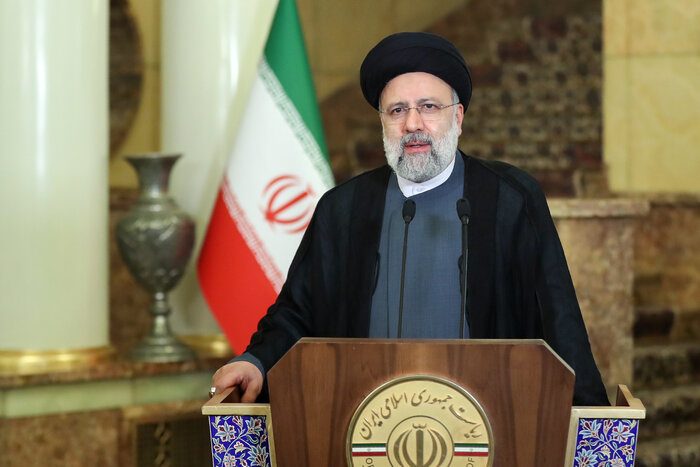During his speech, Qatar’s amir stressed the importance of returning to the 2015 nuclear deal.
Iran’s President Ebrahim Raisi strongly condemned US sanctions on the Islamic Republic during his virtual speech at the 76th UN General Assembly [UNGA] on Tuesday, his debut at the meeting since being sworn in in August.
“Sanctions are the US’ new way of war with the nations of the world,” said Raisi, describing economic sanctions during the pandemic as a “crime against humanity”.
Raisi’s speech came amid reports that signalled a possible return to the table of negotiations in Vienna in efforts to restore the Joint Comprehensive Plan of Action [JCPOA].
The US withdrew from the accord in 2018 in a move that severely risked the disintegration of the historic deal.
Commenting on the talks, Raisi echoed previous statement in which he said Iran believes the talks can only be useful if they lead to the lifting of crippling sanctions.
“We don’t trust the promises made by the US government,” said Raisi.
The withdrawal at the time was deemed to be part of efforts by the former Donald Trump Administration to “apply maximum pressure” on Iran by imposing crippling economic sanctions. However, this led heightened tensions between the two countries.
Afghanistan, Palestine and climate change: Qatar’s amir spotlights key issues at UNGA
Tensions culminated in 2020 with the assassination of Iran’s Islamic Revolutionary Guard Corps [IRGC] Major General Qassem Soleimani who was killed in a targeted US drone strike in Iraq.
However, under the new Joe Biden administration, talks in Vienna were met with widespread hope to revive the JCPOA, with the p4+1 holding indirect negotiations between the US and Iran. These talks were paused following the sixth round in July to allow for the results of the Islamic Republic’s elections.
However, attacks on Iran’s nuclear site and a lack of US commitment to its part of the deal by lifting the sanctions drove Tehran to retaliate. Soon after, Iran increased its nuclear enrichment to 60% – its highest level so far.
“Nukes have no place in our defence doctrine and deterrence policy,” said Raisi, dismissing claims over the development of nuclear weapons.
A senior US State Department told the Associated Press [AP] that Washington took note of Raisi’s speech, saying actions are more important than talks.
“We continue to believe that we need to re-engage in the Vienna context as soon as possible,” said the official, who spoke to reporters on condition of anonymity.
Also addressing the UNGA on Tuesday, Qatar’s Amir Sheikh Tamim bin Hamad Al Thani stressed the importance of returning to the nuclear deal.
“There is no solution to differences and differences in views with Iran except through rational dialogue on the basis of mutual respect, and this applies to the issue of returning to the nuclear agreement with Iran,” said Sheikh Tamim.
Qatar had previously said it will “spare no efforts” in ensuring the 2015 nuclear agreement is restored. Members of the accord are currently engaging in efforts to resume indirect Vienna talks between Iran and the US.
“I do not think that anyone has an alternative to this approach, including those who oppose returning to the agreement,” added Sheikh Tamim, without specifying an entity or party.
US foreign policy
President Raisi also took aim at the US’ foreign policies, describing its military presence in the Middle East as a “lack of rationality”.
“Today, the US does not get to exit Iraq and Afghanistan but is expelled. And, at the same time, it is the oppressed people, from Palestine and Syria to Yemen and Afghanistan, as well as the US taxpayers, who have to pay for this lack of rationality,” said Raisi.
Commenting on the fight against terrorism, Raisi said Israel’s “occupier Zionist regime is the organiser of the biggest state terrorism whose agenda is to slaughter women and children”.
He also tapped into the so-called “Deal of the Century”, describing it as a failure similar to other deals that have been forced on Palestinians.
“There is only one solution: holding a referendum with the participation of all Palestinians of all religions and ethnicities including Muslims, Christians and Jews,” said Raisi.







